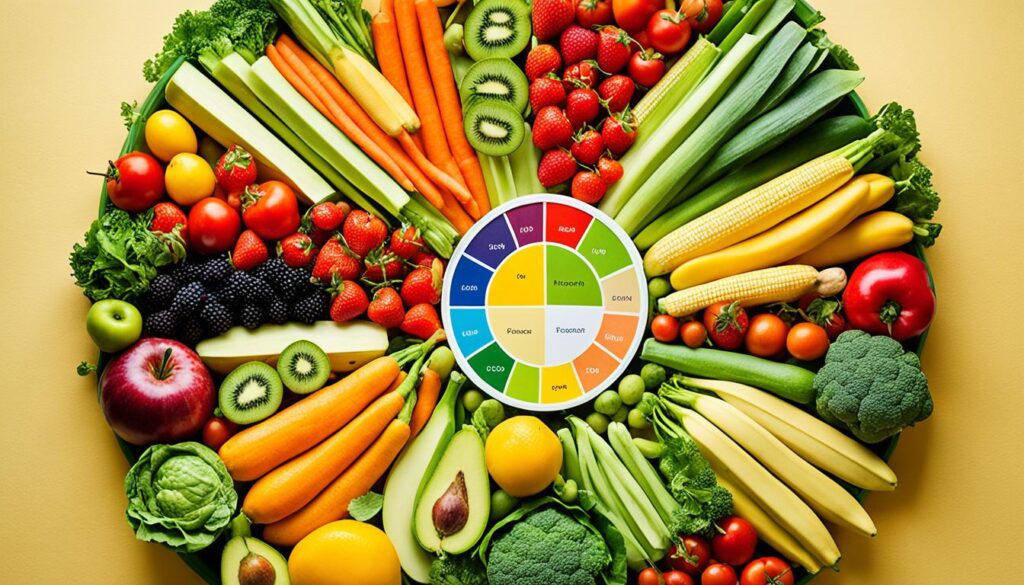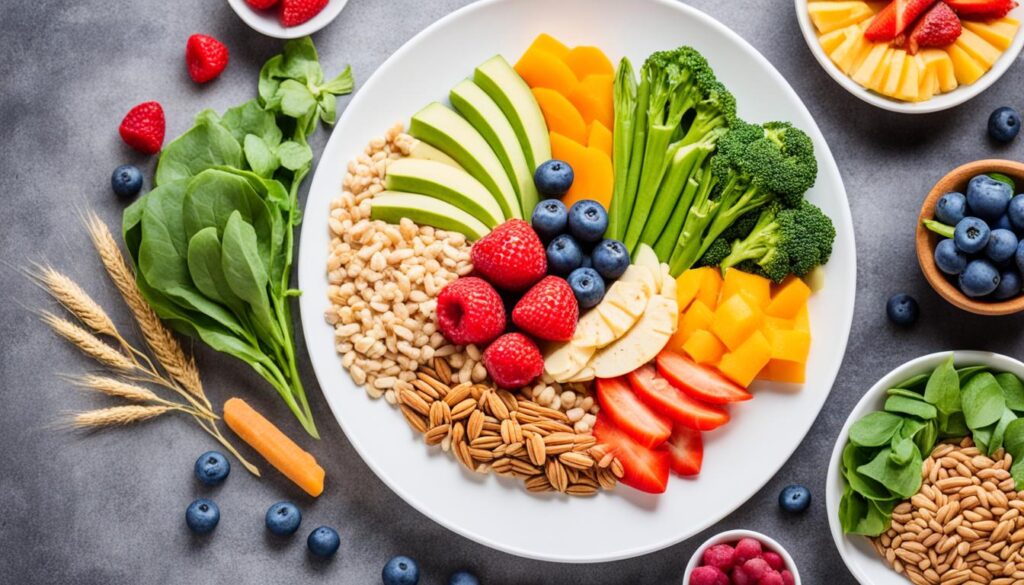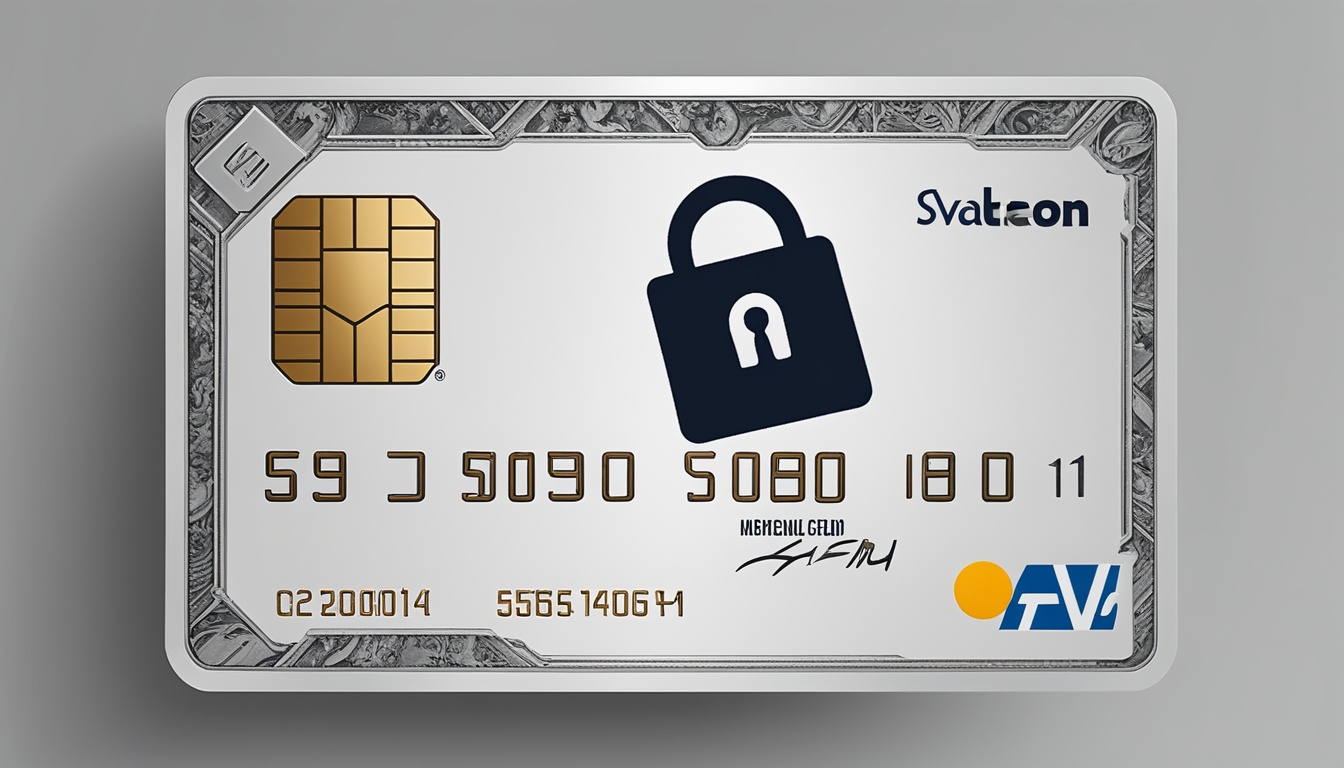Ever thought how a good meal plan can change your health journey? It’s key for hitting health goals. Silvia Veri, a diet expert at the Beaumont Weight Control Center – Canton, says making meal plans boosts making better food choices.
Meal planning isn’t just organizing meals. It also boosts your nutrition plan’s success. With a plan, you pick healthy foods more than bad, spur-of-the-moment choices. Studies prove planned meals help with weight and lessening disease risks1. This habit helps reach and keep your health goals.
Benefits of Planning Your Meals
Planning your meals has many perks that boost your life quality. It helps stick to your diet and eat healthier. Meal prep is key for staying well.
Learn Portion Control
Planning meals teaches you about portions. Preparing food ahead lets you better manage how much you eat. This stops you from eating too much, especially at restaurants with big servings.
Planning ahead helps with controlling portions23. It’s good for weight management by letting you pick ingredients and portion sizes3.
Eat Healthy
Meal prep makes you eat more fruits, veggies, grains, and beans2. With healthy food ready, you’ll choose it over junk food. This leads to a balanced diet3.
Adding these to your diet helps meet nutritional goals. It goes hand in hand with weight loss plans.
Save Time
Planning meals saves time by cutting last-minute decisions2. No stress over what to cook saves time. Often, a busy day means fast food, but prepped meals reduce this.
Prepping meals lessens time spent cooking, easing stress3.
Save Money
A meal plan helps save money by cutting dine-out costs2. Sticking to a shopping list stops impulse buys. Meal planning is great for budgeting3.
Avoid Wasting Food
Meal planning also reduces food waste2. Every item you buy has a plan, minimizing leftovers. It’s eco-friendly and makes every ingredient count for your balanced diet.
How to Start a Healthy Meal Diet Plan
Starting a healthy meal plan is smart. First, examine your eating habits and decide what you want to achieve. This helps you create a plan that fits your health goals.
Assess Your Current Diet
First, look closely at what you eat now. You can use tools like the Meal Plan Selection Tool. They show what you need to change. Knowing your daily nutrients helps you make a balanced diet. For example, Americans often eat too much sugar, with women exceeding 6 teaspoons and men 9 teaspoons daily4.
Set Clear and Achievable Goals
Then, set real goals that fit you. You might want to lose weight, gain weight, or eat healthier. Choose specific calorie and protein targets. Your meal plan can vary, like 1,200 or 2,000 calories a day. Fill half your plate with fruits and vegetables. The other half should have protein and grains, following the Dietary Guidelines for Americans5.
Choose the Right Meal Plan For You
It’s important to pick the right plan. It should match your health goals, like losing weight or eating balanced meals. Include lots of veggies, fruits, whole grains, and lean proteins4. For example, swap a big-calorie restaurant burrito for one with fresh veggies and chicken. It has fewer calories5.

Start with these tips to make a diet plan that’s good for you and fits your life. Having clear goals and the right plan helps you keep up with your healthy eating.
The Role of Balanced Diet in Health Improvement
Eating well is key to better health and lowering the chances of many illnesses. The World Health Organization shows eating various fruits and vegetables lowers the risk of heart disease and lung cancer6. Adding different foods to your meals makes sure you get the nutrients you need, helping both body and mind.
Incorporating Fruits and Vegetables
Fruits and veggies are crucial for a healthy diet as they offer vitamins, minerals, and fiber. These can help you avoid chronic diseases6. Try to eat many colors of fruits and veggies every day to get all their health benefits.
Importance of Whole Grains
Whole grains help you feel full and add important nutrients to your meals. Eating whole grains, like brown rice and quinoa, links to lower death rates from heart disease and cancer6.
Include them in your diet to stay full longer and get fiber and nutrients.
Inclusion of Lean Proteins
Lean proteins, like chicken, fish, beans, and lentils, are important for keeping muscles strong and staying healthy. They are also good for older individuals, helping with body shape and hunger control6. Eating these proteins helps in weight management and muscle building, while keeping saturated fats low.
Healthy Fats and Their Benefits
Healthy fats help with absorbing nutrients and overall health. Extra virgin olive oil, avocados, and nuts are top choices, benefiting heart health and reducing inflammation7. Including these in your diet boosts brain health and controls inflammation.
Knowing the benefits of a balanced diet, including fruits, veggies, whole grains, lean proteins, and healthy fats, is key for better health. This well-rounded approach offers long-term health rewards, helping you reach your wellness goals and live healthily.
Understanding Different Meal Plans: Which One is Right for You?
Choosing the right meal plan is key to meeting health goals. There’s a variety of meal plans like the Mediterranean diet, DASH diet, and plant-based diets. Each one has special benefits that match different needs and likes.
The Mediterranean Diet
The Mediterranean diet is all about whole foods. It includes lots of fruits, vegetables, seafood, and healthy fats like olive oil. You’ll eat dairy in small amounts, mainly as yogurt and cheese. This diet is famous for boosting heart health and cutting the risk of chronic diseases.
The DASH Diet
The DASH diet stands for Dietary Approaches to Stop Hypertension. It aims to lower blood pressure with foods rich in nutrients. You’ll eat plenty of fruits, vegetables, whole grains, and lean proteins, and keep sodium low. Many health groups recommend it for a healthier heart.
Plant-Based Diets
Plant-based diets cut out meat, poultry, and seafood, turning to plant foods instead. You’ll enjoy soy products, beans, nuts, seeds, and whole grains. This diet helps with weight control and long-term health by focusing on foods that are rich in nutrients but low in calories. Studies support that an active lifestyle plays a big role in fighting disease and keeping you healthy. These findings back up how plant-based diets can help in staying healthy overall8.
| Diet Plan | Main Features | Health Benefits |
|---|---|---|
| Mediterranean Diet | Fruits, vegetables, seafood, minimal dairy | Heart health, reduced chronic disease risk |
| DASH Diet | Fruits, vegetables, whole grains, lean proteins, low sodium | Improves heart health, reduces blood pressure |
| Plant-Based Diets | Focus on soy, beans, nuts, seeds, whole grains | Supports weight management, improves overall wellness8 |
Meal Prep Ideas for a Successful Healthy Eating Plan
Making a meal prep plan is key for a healthy eating plan. Planning weekly menus, batch cooking, and having quick snacks ready makes meal prep easier.
Planning Weekly Menus
Starting a weekly menu plan makes meal prep simpler and helps you follow your nutrition plan. You’ll avoid buying things you don’t need by knowing what to buy. Eating about 1500 calories a day becomes easier, and you get balanced nutrition every day4.

Batch Cooking and Freezing
Batch cooking and freezing is a great strategy. It means you always have a healthy meal ready. Soups, stew, and other recipes can be made in large amounts and saved for later9. This saves time and keeps nutritious meals always available.
Quick and Healthy Snack Options
It’s important to have healthy snacks ready. Eggs, granola, and muffins are good for days and are great for quick snacks9. Eating fruits, veggies, and protein-rich snacks in the afternoon helps stick to your diet. They also keep you away from too much sugar, which many people eat too much of4. These snacks help you stay energized and on track with weight loss.
Low Carb Diet: Is It a Sustainable Option?
Many people choose low carb diets to lose weight quickly. But it’s key to look at the good and bad points to see if it’s a lasting choice.
Benefits of Low Carb Diets
Low carb diets limit carbs to less than 26% of daily calories. That’s under 130 grams of carbs per day for someone eating 2000 calories10. Plans like the Keto, Atkins, and Paleo diets focus on meat, fish, eggs, and veggies that don’t have much starch10.
Studies say these diets can help you lose more weight in the short term than low-fat diets. They might also lower the risk of diabetes and heart disease11.
Potential Downsides
However, low carb diets can have downsides. Cutting carbs quickly can cause issues like constipation, headache, and muscle cramps. You might also feel tired or weak from ketosis11.
Over time, eating too few carbs may lead to not getting enough vitamins and minerals. It can also cause stomach problems. Some studies even say that very low carb diets could increase the risk of dying early if carbs make up less than 40% of what you eat12.
Low Carb Meal Examples
A healthy low carb eating plan includes many nutrient-rich foods. You should eat lean proteins, healthy fats, and veggies with low starch10.
For breakfast, try scrambled eggs with spinach and avocado. Lunch could be a grilled chicken salad with olive oil dressing. Dinner might be baked salmon with asparagus and some berries10. Snacks like Greek yogurt, nuts, and hard-boiled eggs keep you within the carb limit10.
Expert Tips for Sticking to Your Nutrition Plan
To stick to a good nutrition plan, choose smart foods and beat common roadblocks. Eating 4-5 meals or snacks daily can help manage your hunger and weight13. The USDA’s MyPlate Kitchen gives you healthy, tasty recipes that meet your goals, making meals both good for you and delicious.

Adding snacks that are high in protein and fiber can stop cravings and support healthy eating all day14. Women should aim for 25 grams of fiber per day, and men, 38 grams13. It’s smart to pick whole foods over highly processed snacks, which can harm your health14.
Drinking alcohol can make you hungrier and less likely to stick to healthy foods15. Swapping junk food with fruits or veggies is a smart move15. Writing down what you eat for six days a week can help you lose twice as much weight, giving you insights into your habits and helping you stay on track13.
Setting a reasonable weight loss target of 1-2 pounds a week makes success more likely13. Planning your meals can save money and encourage healthier eating choices15, keeping you from making last-minute, unhealthy meal choices.
Here is a detailed comparison to help you maintain consistency:
| Strategy | Benefit |
|---|---|
| Eat 4-5 meals/snacks | Better appetite control13 |
| Fiber intake | 25g for women, 38g for men13 |
| Food diary | Twice as much weight loss13 |
| Advance meal planning | Save money, make healthier choices15 |
| Healthy snacks (fruit/veg) | Curbs cravings14 |
Keeping up with a nutrition plan takes effort, but smart, aware choices make it doable. Use measuring cups and spoons for portion control. Focus on small, doable changes for lasting weight loss and healthy eating habits15.
Conclusion
Thinking about your health goals highlights how important a good meal plan is. A smart eating plan helps you control portions and choose healthier foods. This matches your health aims. A 1989 study by the National Research Council said diet is key in fighting chronic diseases. It shows the huge role food plays in our daily lives16.
Choosing a balanced diet has many pluses. It saves time, money, and cuts down on food waste. When you plan meals, you stick to your diet better, helping you succeed over time. Whether it’s low-carb, plant-based, or another diet, picking what works for you boosts your health. This same study reminds us to check dietary advice and know our health risks to improve our eating habits16.
Eating well means adding fruits, veggies, whole grains, lean proteins, and healthy fats to your diet. With new knowledge about diet and disease, you’re ready to make better food choices. Use expert advice and spend time prepping meals. This way, you’ll enjoy a diet that fits your life and supports your health.






